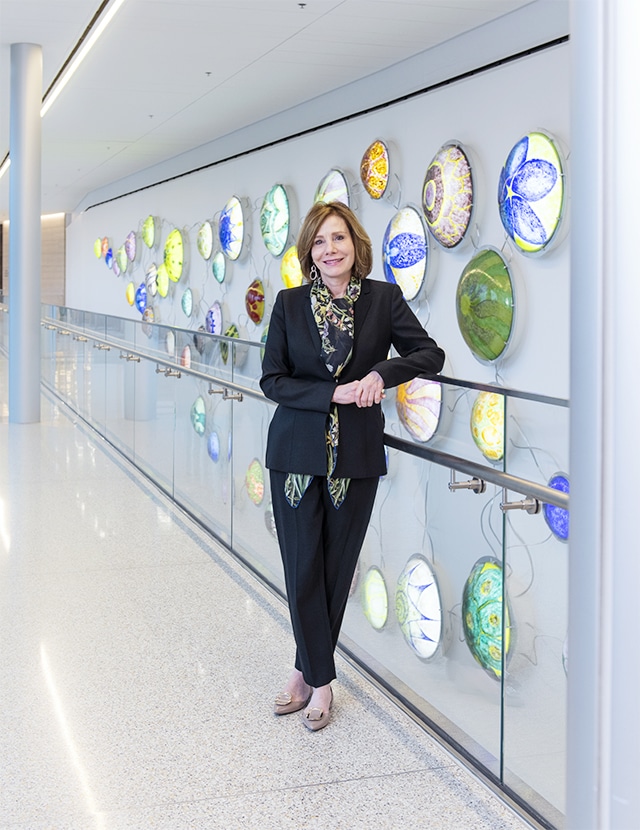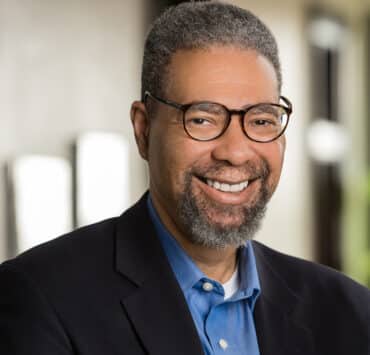Fifteen years ago, Julie Celano reached a pivotal moment in her career. The veteran HR leader left a publicly traded insurance company for a role at a comprehensive cancer center. She never looked back. “If your DNA is about mission, then it’s easy to transition to moving toward something where you know the work is making a difference in the lives of people,” she says.
Celano wanted to surround herself with passionate, creative, like-minded people—those who want to bring a healthy dose of urgency and sensibility into healthcare. After all, nonprofit health systems have to “have a margin to have a mission.”
Now, Celano acts as senior vice president and chief human resources officer at the University of Kansas Health System in Kansas City. The nonprofit academic medical center features a Level I Trauma Center and accommodates nearly three hundred thousand outpatient visits per year.
“If your DNA is about mission, then it’s easy to transition to moving toward something where you know the work is making a difference in the lives of people.”
Julie Celano
When AHL first connected with Celano, she was just sixty days into her tenure and embarking on a journey to create lasting improvement related to diversity and inclusion. “People tell you to treat everyone the same, and I think that is completely misguided. We have to treat everyone differently and respond to their uniqueness,” the SVP said as she described launching a “Be Here, Be You, Belong” campaign.
Nearly five years later, Celano says she is still “focused on making things better for the staff, so they can make things better for the patients.” But she wants to go beyond superficial measures and make a real difference.
The COVID-19 pandemic hit the University of Kansas Health System just after Celano was implementing programs, hitting her stride, and seeing the fruits of her labor. “Our people are resilient, but this pandemic has pushed them beyond what I think is reasonable, and they need more than pizza parties and food carts,” she says. “They need someone to listen deeply and know what it’s like to experience what they are going through.”
The University of Kansas Health System HR teams are responding by taking steps both small and large to address emerging well-being concerns. On one end of the spectrum, they’re working to implement hydration stations, put healthier food in the cafeteria, and provide education about the effects of good nutrition. They’ve also increased access to mental health services; removed time-consuming, low-value tasks from job responsibilities; provided financial wellness tools; and strengthened communication across the organization.

Julie Celano knows these measures touch care providers and patients alike, and says, “Health outcomes for patients will be better if we’re making sure our providers are better.” She adds those on the front lines can lead by example and influence their patients when they also are taking care of themselves.
While the system is making progress in many areas, Celano is bold and frank about what’s left to accomplish. She partnered with a consultant to develop a series of learning sessions designed to educate and promote the concept of inclusive leadership to her executive team and department chairs—a total of seventy-two leaders. She is also working to develop a guiding coalition that will assist with the implementation of DEIB (diversity, equity, inclusion, and belonging) initiatives and has introduced principles cleverly adapted from the the University of Kansas Health System’s mission statement to make DEI closely aligned with the organization. She took the existing vision statement and built DEIB principles into it so it would become part of the fabric of the organization—its “shared commitment” to DEIB.
“My mission is to strengthen connections and give people an opportunity to thrive. And this is the perfect place to do it.”
Julie Celano
Why is Julie Celano taking this approach? “Successful DEI takes hard and commited work,” she says. “You can’t simply hire diverse talent and hope things magically get better if you don’t educate your leaders about inclusive leadership.” She also wants to ensure existing employees feel valued as well as safe. The University of Kansas Health System developed a new patient discrimination policy teaching providers how to respond to inappropriate requests for certain providers based on protected characteristics.
To Celano and her peers, moving DEI initiatives forward means thinking broadly about how they can maximize their impact to include people with disabilities. In the past twenty-four months, the University of Kansas Health System hired eight such individuals, including a blind cafeteria worker and a greeter with Down syndrome. Celano continues to modify policies and hiring processes to focus on what people in this community can do and how to equip them to be successful in the organization.
For Julie Celano, it all goes back to being mission driven. “My mission is to strengthen connections and give people an opportunity to thrive,” she says. “And this is the perfect place to do it.”
Polsinelli: Julie Celano is not only a brilliant and accomplished leader in her field, but she is also a dedicated and thoughtful advocate for the employees of the University of Kansas Health System. As the Chief Human Resources Officer, Julie leverages her unique background, industry knowledge and passion to drive transformative diversity, equity and inclusion initiatives that truly put people first.


